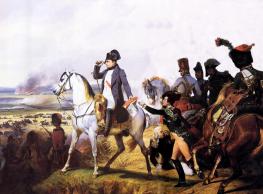Napoleon’s Secret Weapon
 …now you can learn it; better yet, it’s free.
…now you can learn it; better yet, it’s free.
Napoleon knew how to inspire great achievements in others. Why everyone doesn’t make use of Napoleon’s knowledge, I don’t know. They could dramatically improve performance, if they did. Before I tell you Napoleon’s secret, you should understand why you probably don’t already know it.
The culture of organizations is driven by the leader. Most managers were picked because they had the most technical skills in the promotion pool. They were simply the best of all the individual contributors at whatever their new department does. If their new department develops software, they were the best developer available.
Management needed a new leader for the department and took the most expedient route; they took the best technical developer away from doing what they did best, and made him/her into a people manager. Doubtless there was little training nor notice in advance. It was sink or swim.
Chances are that nobody ever told the new manager about the work of Frederick Herzberg. (His research revolutionized the study of employee motivation.) So when problems arise in their departments, the new managers revert to their comfort zone and simply solve the problems themselves.
Then the managers complain that they’re overworked and the employees are not developing their skills. That inability to delegate to others, and to motivate them to take on additional responsibilities is so pervasive in the workplace that it needs no further explanation.
The question is, how does someone who works in this environment (you) get out of the quicksand and start getting productive? Herzberg’s amazing findings point the way
Here are the factors that motivate employees as researched by Herzberg1 in order of effectiveness.
- achievement
- recognition
- work itself
- responsibility
- advancement
- growth
We are going to concentrate on the first two, achievement and recognition. Achievement in this context means any accomplishment that someone in your workgroup achieves. Recognition comes when you or a manager visibly acknowledges an achievement to the person who did it.
You can use these two factors to dramatically improve your own productivity whether you’re an individual contributor or a boss.
If you’re an individual contributor, like it or not, you depend on others to get your work done. If you work in an identifiable team, in a conventional workplace, or as an independent contractor, there is almost no chance that you can reach your objectives without somebody else filling in a blank somewhere. You need to know about Frederick Herzberg.
If you’re a boss, you’re totally dependent on the work of others. Your employees make you, or break you. Even more than the individual contributor, you need to know how to use the results of Frederick Herzberg.
So how do you use achievement and recognition to motivate others? The answer is simple. When someone accomplishes something that helps you do your job, make sure that you let that person know how their actions helped.
Does it work? It certainly does. Herzberg’s research provides the data. But it makes good intuitive sense, as well. How many people do you know who buy something extravagant from time to time? Why do they do it? Some people do it for the self satisfaction. But I guarantee you that at least part of the reason is to impress others.
I have a friend who drives a Mercedes. I asked him why. He didn’t know anything about the obvious technical superiorities of the car. The fact is that he bought the car simply to impress his friends. He paid twice as much for that car as he would have for one that would have filled his needs just as well, but without the cache.
The point is that people will pay a lot of money for simple recognition of their own achievements. Why not use that powerful desire to motivate those who help you do your work? You can give them that recognition directly, and bypass the big money outlay.
Recognition of employee achievement is a critical component of any business improvement project. Recognition, combined with measurement, and team based objectives can work miracles.
Napoleon used recognition to great effect. He conquered large parts of Europe. Someone asked him how long this could continue. His response was, “A soldier will fight long and hard for a bit of colored ribbon. Give me enough ribbon to cover the tunics of my soldiers and I will conquer the world”
Napoleon was one smart guy. If you want to motivate others, use Napoleon's secret weapon.
1One More Time: How Do You Motivate Employees? Frederick Herzberg, Harvard Business Review, September 1987.
"Napoleon Wagram" by Horace Vernet - [1]. Licensed under Public domain via Wikimedia Commons - http://commons.wikimedia.org/wiki/File:Napoleon_Wagram.jpg#mediaviewer/F...

Comments
Great article. We'll
Great article. We'll certainly use it in our future organization. Thank you very much.
Add new comment